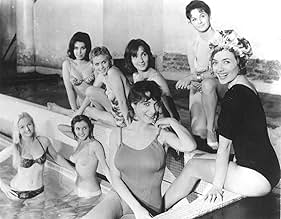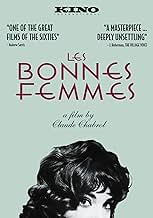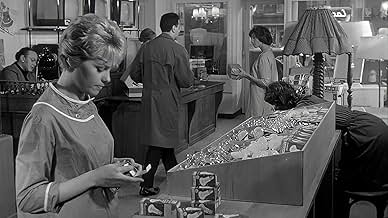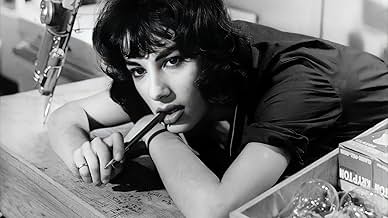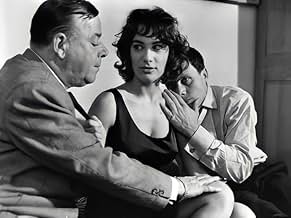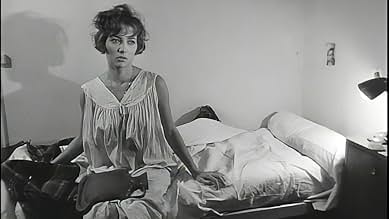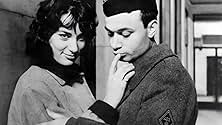IMDb रेटिंग
7.2/10
3.3 हज़ार
आपकी रेटिंग
अपनी भाषा में प्लॉट जोड़ेंFour Parisian women navigate the world of romance and daily life looking to fulfill their dreams but often find real-life to be inescapable.Four Parisian women navigate the world of romance and daily life looking to fulfill their dreams but often find real-life to be inescapable.Four Parisian women navigate the world of romance and daily life looking to fulfill their dreams but often find real-life to be inescapable.
- निर्देशक
- लेखक
- स्टार
- पुरस्कार
- कुल 1 नामांकन
Gabriel Gobin
- Le père d'Henri
- (as Gabriel Gobain)
फ़ीचर्ड समीक्षाएं
A friend of mine - a film scholar - once said that this film shouldn't work but it does. He was absolutely right. I cannot think of one good reason why this film should be as good as it is. The tone is observational, like many films of the "New Wave," but it lacks the frenetic energy of Godard, or the jaded lyricism of Truffaut. The tone of the film changes drastically at several points, and in any other film this would become a big turn off. But a strand of sincere honesty about the characters and their emotions holds the film together, stronger than any formality.
Let the film take you where it wants you to go, and the experience is wonderful.
Let the film take you where it wants you to go, and the experience is wonderful.
Chabrol's career is often seen as moving from the naturalism of his early films to the extreme stylisation of his great mid-period. It's not as simple as that, but in 'Les Bonnes Femmes', Chabrol achieves a balance between the two that he has rarely equalled. The story of four shopgirls, their work and social lives, has all the plotless and poignant banality of realism, while the closing third, with its move from Paris to the country, its seducer-cum-motorbike-riding-devil (reg. no.: 666) talking about the Creator, as little schoolboys called Balthasar pass by; and its closing vision of Hell/Purgatory bespeak a more Cocteau-like world of mythology and religion. But there is Cocteau too in the framing of Jacqueline in the shop window, while Chabrol's filming of treacherous nature later on is uncommonly vivid. Although 'Bonnes' is his least typical film, it is also his most lovable, and seems to get richer with the years.
Claude Chabrol made a film before Les bonnes femmes, Les Cousins, which is what made him known as part of the French New Wave (he preceded Truffaut and Godard by a year). But viewing Les bonnes femmes before seeing Les Cousins, I almost feel like this is a director's first film, for a director like Chabrol, as it shows a lot of his concerns as a filmmaker: an observational stance with women, their sexuality and their distance from the opposite sex, the mundane in a bourgeois life, and the Hitchcock angle of danger and the unknown. It's also in line with the other Nouvelle Vague films in the sense that the filmmaker has broken out of any ties to a studio or sets, and everything is out in the streets or on location in places like nightclubs and music halls and swimming pools, and usually with hand-held cameras and (seeming) improvisation with the actors. This is a gritty, on-the-streets Chabrol one isn't used to from seeing films like This Man Must Die and The Butcher.
And yet I don't know if I can say it's as great as the big early films of the period like The 400 Blows and Breathless. Chabrol's film does carry, I'm sure, some personal weight. And he's interested in these girls, their casual life and goings-on, and how so easily one of them can be lured by a mysterious man in a mustache who follows them around in a motorcycle. But it's such a loosely structured film- barely a plot, even less, if you can imagine, than Breathless- that it takes a moment for us to realize something is going on. Which perhaps is part of Chabrol's angle here: like Fellini's film I Vitelloni, we're just watching these four girls in their everyday occurrences, going to a zoo, going to a nightclub and hooking up with two (obnoxious) strangers, going to a music gall where one of the girls is secretly singing and doesn't want to go on for fear of embarrassment of the others seeing her, and just walking around. Or, as well, the complacency of working at a TV store where no one comes in.
We are drawn in to these girls and who they are, however limited they're really shown as full characters (more-so Chabrol is interested, I think, in these girls as 'types' possibly, or in looking at them in a semi-documentary perspective). And metaphor is used from time to time; I'm sure the visit to the zoo, and Chabrol's carefully timed and composed reaction shots of the animals in the cages, is deliberate as to the girls' own self-prison of 20-something frivolity. And there's also the matter, again, of the motorcycle guy, who somehow charms this girl. Actually not somehow, as in this sort of Nouvelle Vague film-world it's precisely the kind of guy a girl would fall for, even one seemingly so uptight as the one he goes after. Seeing how this plays out between them can go one of two ways, and how Chabrol shows it in the last fifteen minutes is totally masterful. There's a sense of the inevitable, but he keeps us uncertain as an audience, which is good. I'm glad I couldn't quite see where the ending would go, though when it came it made sense and was satisfying (it even raised up the worth of the film overall a full notch).
But a masterpiece? Probably not. It's like a breezy fling through a Parisian quarter, on the dark streets and cool nights with beautiful girls and not-so-beautiful but flirty men, and it has some wonderful moments. It just doesn't add up completely into something that makes you want to shake your friend up and say "You MUST watch this!" like 400 Blows, or even The Butcher.
And yet I don't know if I can say it's as great as the big early films of the period like The 400 Blows and Breathless. Chabrol's film does carry, I'm sure, some personal weight. And he's interested in these girls, their casual life and goings-on, and how so easily one of them can be lured by a mysterious man in a mustache who follows them around in a motorcycle. But it's such a loosely structured film- barely a plot, even less, if you can imagine, than Breathless- that it takes a moment for us to realize something is going on. Which perhaps is part of Chabrol's angle here: like Fellini's film I Vitelloni, we're just watching these four girls in their everyday occurrences, going to a zoo, going to a nightclub and hooking up with two (obnoxious) strangers, going to a music gall where one of the girls is secretly singing and doesn't want to go on for fear of embarrassment of the others seeing her, and just walking around. Or, as well, the complacency of working at a TV store where no one comes in.
We are drawn in to these girls and who they are, however limited they're really shown as full characters (more-so Chabrol is interested, I think, in these girls as 'types' possibly, or in looking at them in a semi-documentary perspective). And metaphor is used from time to time; I'm sure the visit to the zoo, and Chabrol's carefully timed and composed reaction shots of the animals in the cages, is deliberate as to the girls' own self-prison of 20-something frivolity. And there's also the matter, again, of the motorcycle guy, who somehow charms this girl. Actually not somehow, as in this sort of Nouvelle Vague film-world it's precisely the kind of guy a girl would fall for, even one seemingly so uptight as the one he goes after. Seeing how this plays out between them can go one of two ways, and how Chabrol shows it in the last fifteen minutes is totally masterful. There's a sense of the inevitable, but he keeps us uncertain as an audience, which is good. I'm glad I couldn't quite see where the ending would go, though when it came it made sense and was satisfying (it even raised up the worth of the film overall a full notch).
But a masterpiece? Probably not. It's like a breezy fling through a Parisian quarter, on the dark streets and cool nights with beautiful girls and not-so-beautiful but flirty men, and it has some wonderful moments. It just doesn't add up completely into something that makes you want to shake your friend up and say "You MUST watch this!" like 400 Blows, or even The Butcher.
i liked this film. it has an ambigious quality about it, almost paradoxical. it has a feel of a documentary and is observational in nature, yet there is a obvious message or view taken by chabrol and the women in this film. they're doomed objects of desire for men. the women have this elusive quality about them, they're beautiful and somewhat misguided about the men in thier lives. they seem unattainable, yet vulnerable to a ominous unspoken danger that awaits them that is denoted by the music. there's this creepy yet mysterious sounding music that runs through the film when the female characters roam through the streets. and for some reason, all the men in this movie are misogynist jerks! they disrespect these women and believe they're entitled to them. yet, these women flirt with them and passively resist them for most of the film. chabrol lovingly shoots these women and has affection for them, but also sadness at their romantic naivety about the men in their lives that will bring them doom.
The film shows a weekend in the lives of four Parisian shop girls, from their Friday night out in the nightclubs of Paris through to a Sunday outing into the countryside. All four dream of escaping their humdrum existence: Ginette (Stephane Audran) is trying to start an alternative career as a music hall singer, Rita (Lucile Saint-Simon) is engaged to a shop owner, Jane (Bernadette Lafont) is wined and dined by two married businessmen, and Jacqueline (Clothilde Joano) falls in love with a biker who is stalking her. The monotony of the girls' lives is shown as they spend Saturday in the shop just waiting for the moment when they can go home. At the same time Chabrol shows a fascinating portrait of the city at work and at play. The storyline holds the viewer's interest, the acting is excellent (especially Lafont, and despite some terrible overacting from the girl's boss), and the director hints at some of the gruesome shocks of his later films.
क्या आपको पता है
- ट्रिवियाCaused so much resentment among the public upon its release that some went as far as breaking seats in theaters as sign of protest.
- गूफ़After Ernest strangles Jacqueline, he rips his coat out from under her and flips her over. The supposedly dead Jacqueline immediately moves her arm to catch herself from going face first into the mud.
- भाव
Monsieur Belin: My pleasure in life is to reprimand little girls... It's my prerogative.
- कनेक्शनFeatured in Le fils de Gascogne (1995)
टॉप पसंद
रेटिंग देने के लिए साइन-इन करें और वैयक्तिकृत सुझावों के लिए वॉचलिस्ट करें
- How long is The Good Girls?Alexa द्वारा संचालित
विवरण
बॉक्स ऑफ़िस
- US और कनाडा में सकल
- $6,578
- US और कनाडा में पहले सप्ताह में कुल कमाई
- $6,578
- 15 अग॰ 1999
- चलने की अवधि1 घंटा 40 मिनट
- रंग
- पक्ष अनुपात
- 1.66 : 1
इस पेज में योगदान दें
किसी बदलाव का सुझाव दें या अनुपलब्ध कॉन्टेंट जोड़ें

